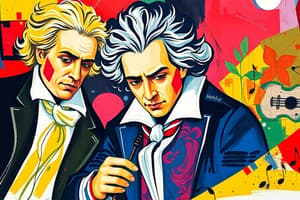Podcast
Questions and Answers
The exposition of Beethoven's symphony No. 5 opens with a four note _______.
The exposition of Beethoven's symphony No. 5 opens with a four note _______.
motive
How many symphonies did Beethoven write?
How many symphonies did Beethoven write?
nine
Which of Beethoven's symphonies sets the famous ode to joy poem by Schiller?
Which of Beethoven's symphonies sets the famous ode to joy poem by Schiller?
No. 9
Which of Beethoven's symphonies includes a motive that the composer described as 'fate knocking at the door'?
Which of Beethoven's symphonies includes a motive that the composer described as 'fate knocking at the door'?
Which is NOT a new element introduced by Beethoven in the fifth symphony?
Which is NOT a new element introduced by Beethoven in the fifth symphony?
Which is NOT true of the third movement of Beethoven's fifth symphony?
Which is NOT true of the third movement of Beethoven's fifth symphony?
Which instrument has an unexpected solo cadenza toward the end of the first movement in Beethoven's fifth symphony?
Which instrument has an unexpected solo cadenza toward the end of the first movement in Beethoven's fifth symphony?
The movement of Beethoven's fifth symphony that makes the most extensive use of variation procedure is?
The movement of Beethoven's fifth symphony that makes the most extensive use of variation procedure is?
Which of the movements in Beethoven's fifth symphony is in C major?
Which of the movements in Beethoven's fifth symphony is in C major?
Beethoven's fifth symphony generally follows the outline of the standard multi movement cycle.
Beethoven's fifth symphony generally follows the outline of the standard multi movement cycle.
Fifth symphony opens and closes in the key of C minor.
Fifth symphony opens and closes in the key of C minor.
Various movements of Beethoven's fifth symphony are unified by the opening motive in the first movement.
Various movements of Beethoven's fifth symphony are unified by the opening motive in the first movement.
There is no break between the second and third movements of the fifth symphony because they are linked by a transition.
There is no break between the second and third movements of the fifth symphony because they are linked by a transition.
Beethoven's nine symphonies exemplify his adherence to classical conventions.
Beethoven's nine symphonies exemplify his adherence to classical conventions.
Beethoven worked carefully to balance tradition with innovation in his music.
Beethoven worked carefully to balance tradition with innovation in his music.
In his compositions Beethoven completely abandoned classical formal traditions.
In his compositions Beethoven completely abandoned classical formal traditions.
Beethoven's music is considered 'transitional' between classical era and romantic era.
Beethoven's music is considered 'transitional' between classical era and romantic era.
The first symphony in which Beethoven overly included a personal narrative at heroism was his ninth symphony.
The first symphony in which Beethoven overly included a personal narrative at heroism was his ninth symphony.
Which compositional procedure is NOT heard in this famous symphonic opening?
Which compositional procedure is NOT heard in this famous symphonic opening?
Which part of the sonata-allegro form is heard here?
Which part of the sonata-allegro form is heard here?
Which part of the sonata-allegro form is heard here?
Which part of the sonata-allegro form is heard here?
How does this theme differ from the opening theme?
How does this theme differ from the opening theme?
The term that best describes the texture being applied here is?
The term that best describes the texture being applied here is?
In this excerpt from Symphony No. 5 Beethoven unexpectedly features which instrument?
In this excerpt from Symphony No. 5 Beethoven unexpectedly features which instrument?
Flashcards are hidden until you start studying
Study Notes
Beethoven's Symphony No. 5
- The symphony opens with a memorable four-note motive often associated with "fate knocking at the door."
- Beethoven composed a total of nine symphonies.
- Symphony No. 9 is notable for incorporating Friedrich Schiller's "Ode to Joy" poem.
- In addition to the iconic opening motive, Symphony No. 5 includes dramatic development sections and variations that enhance its narrative structure.
Structure and Innovations
- The second movement is characterized by the extensive use of variation techniques, creating a rich thematic elaboration.
- The third movement is structured in minuet and trio form, yet this is not true as it deviates towards a more progressive style.
- An unexpected solo oboe cadenza appears near the end of the first movement, showcasing Beethoven's innovation.
Tonality and Form
- The symphony exemplifies a typical multi-movement structure, affirming its alignment with classical traditions.
- The second movement is in C major, contrasting the prevailing C minor tonality of the opening and closing sections.
- Beethoven's mastery ensures thematic unity throughout the movements via the initial motive introduced in the first movement.
Key Characteristics
- The transitions between the second and third movements are seamless, as there is no break; they are linked thematically.
- Beethoven's style reflects a transitional nature, incorporating classical structures while introducing fresh, romantic elements.
- His compositions often balance adherence to classical conventions with personal narratives, although he does not completely abandon traditional forms.
Compositional Techniques
- Beethoven employs a sonata-allegro form, with elements such as a fiery first theme and a contrasting lyrical second theme.
- The symphonic opening features an opposition of two melodic ideas, providing a dynamic contrast.
- The overall texture of the piece is described as homophonic, highlighting the clarity of melody against supportive harmonies.
Studying That Suits You
Use AI to generate personalized quizzes and flashcards to suit your learning preferences.




